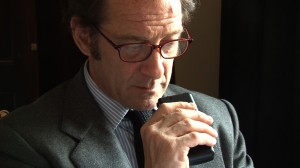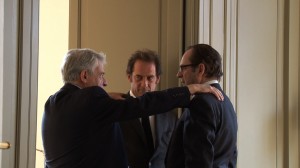‘Pater’ is an exquisite example of metafilm from director Alain Cavalier

For the vast majority of audiences, Alain Cavalier’s new film will prove to be a confounding affair. But for those few people willing to accept the experimental nature of this original approach to filmmaking, the rewards are plentiful.
Pater is best described as an idea, or a series of ideas that eventually end up captured by Cavalier’s lens. In the 105-minute feature, Cavalier and his good friend Vincent Lindon play a bit of adult dress up. They film themselves with the barest of resources in a variety of conversations about imagined plot occurrences. In their fantasy, Cavalier is the president of France, while Lindon is a business-man-turned-politican who plans to become prime minister. Their sole objective while in office is to institute a revolutionary maximum wage, which would prohibit employers from taking too many profits while their workforce remains underemployed.
The concept behind the economic policies are only dealt with on a cursory level. This is not a film of intense politics or ideological stances. Instead, it’s an examination of how the actors can easily blend into the characters they portray. At times, Cavalier is the president, while other times he seems to be more of a filmmaker. More often than not, he’s an amalgam of both these roles. The resulting mixture is always interesting to watch and creates an intimacy that’s difficult to decipher.
Halfway through scenes, when both Cavalier and Lindon are getting into their characterizations and conversing on important national issues, it almost seems as if the actors give up and move on to the next topic. Have we been privy to a piece of heartfelt drama or an exercise in acting? Is there a difference?

The strange structure of the film, with its unconventional plotting and spiraling story line, takes some getting used to, especially in the early stages when the director’s thesis remains hidden. But after one accepts the uniqueness behind the project, Lindon and Cavalier become great company. We watch them eat lunch, picnic in the woods with security guards and in more personal settings like Lindon’s walk-in closet and at the dining room table. Many scenes feature little dialogue, and it’s up to the actors to convey what’s happening. One sequence finds Cavalier fussing with the skin under his chin in front of the mirror. As the president of France, he’s keen on his outfits and appearance, and with a few stretches of his face, we gather that the man is considering some cosmetic surgery.
Lindon receives the meatier of the two roles, mostly because his character (if you can call it that) receives the greatest arc in the story. He’s determined to have the economic policy be the benchmark of his campaign, but he’s worried that his running mate is not wholly committed to the cause. Inevitably, the two have a falling out, and it’s up to Lindon to break the harmony of their political experiment.
The entire movie was shot with a handheld digital camera, so there’s not much nuance in the direction or settings. We watch actors speak their lines, then there’s a blackout and then more actors speak lines. This low-budget filmmaking style, usually a staple of directors much less celebrated than Cavalier, makes the entire project feel like an assortment of home videos. It’s up to each individual viewer whether to accept the no-frills cinematic style.
The closest thing to a summation occurs toward the end of the film when Cavalier and Lindon, probably playing their characters and themselves, have a herring dinner with each other. One camera films a wide shot of their conversation, while each actor picks up another camera and begins to direct the scene. It’s a beautiful example of how this organic material follows a strange, but definite, rubric.
By John Soltes / Publisher / John@HollywoodSoapbox.com


